ANSWER ALL PARTS IN JAVA
Part 1
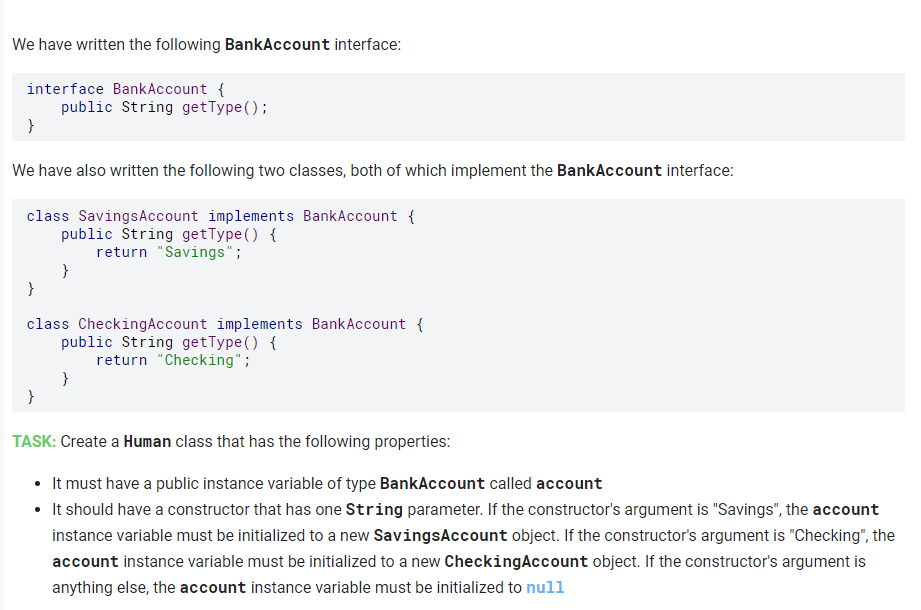 Part 2
Part 2
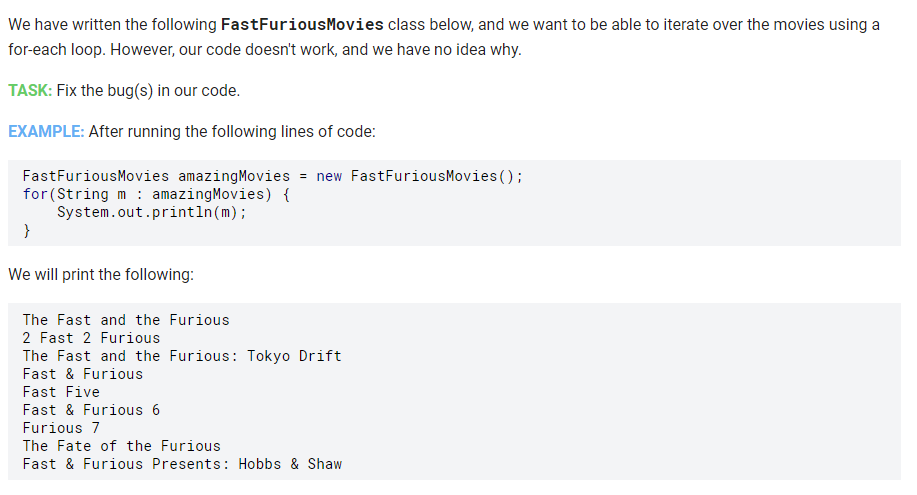
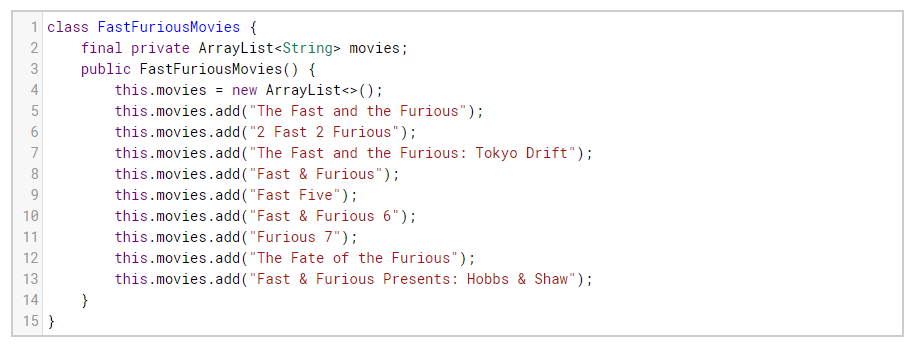 Part 3
Part 3
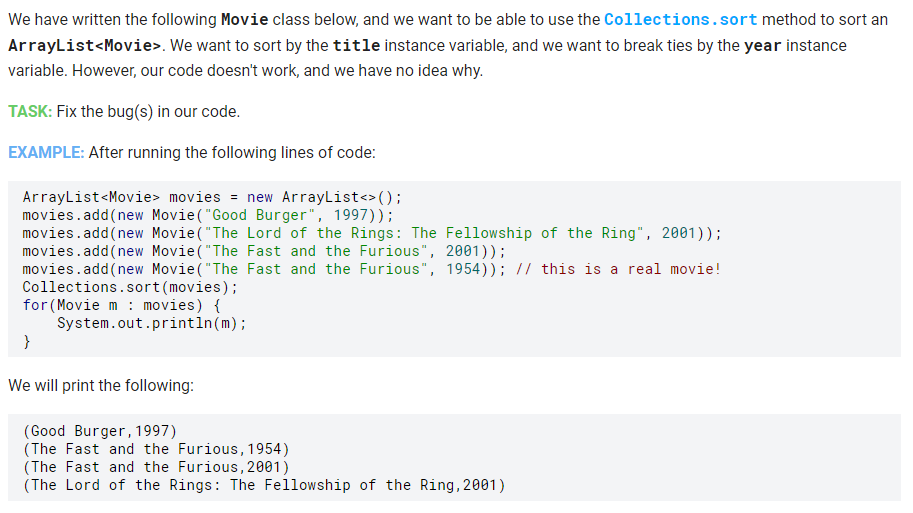
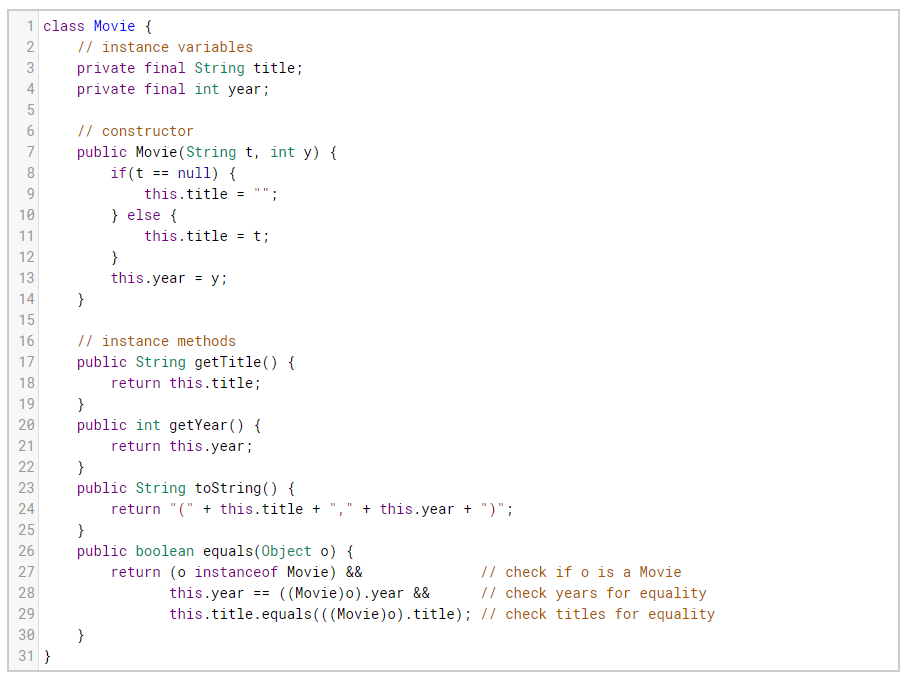 Answer all parts in Java
Answer all parts in Java
We have written the following BankAccount interface: interface BankAccount { public String getType(); We have also written the following two classes, both of which implement the Bank Account interface: class Savings Account implements BankAccount { public String getType() { return "Savings" ; class CheckingAccount implements Bank Account { public String getType() { return "Checking"; TASK: Create a Human class that has the following properties: It must have a public instance variable of type BankAccount called account It should have a constructor that has one String parameter. If the constructor's argument is "Savings", the account instance variable must be initialized to a new Savings Account object. If the constructor's argument is "Checking", the account instance variable must be initialized to a new Checking Account object. If the constructor's argument is anything else, the account instance variable must be initialized to null We have written the following FastFuriousMovies class below, and we want to be able to iterate over the movies using a for-each loop. However, our code doesn't work, and we have no idea why. TASK: Fix the bug(s) in our code. EXAMPLE: After running the following lines of code: Fast Furious Movies amazingMovies = new FastFuriousMovies(); for(String m: amazingMovies) { System.out.println(m); We will print the following: The Fast and the Furious 2 Fast 2 Furious The Fast and the Furious: Tokyo Drift Fast & Furious Fast Five Fast & Furious 6 Furious 7 The Fate of the Furious Fast & Furious Presents: Hobbs & Shaw 1 class Fast FuriousMovies { final private ArrayList
movies; public FastFuriousMovies() { this.movies = new ArrayList(); this.movies.add("The Fast and the Furious"); this.movies.add("2 Fast 2 Furious"); this.movies.add("The Fast and the Furious: Tokyo Drift"); this.movies.add("Fast & Furious"); this.movies.add("Fast Five"); this.movies.add("Fast & Furious 6"); this.movies.add("Furious 7"); this.movies.add("The Fate of the Furious"); this.movies.add("Fast & Furious Presents: Hobbs & Shaw"); We have written the following Movie class below, and we want to be able to use the Collections. sort method to sort an ArrayList. We want to sort by the title instance variable, and we want to break ties by the year instance variable. However, our code doesn't work, and we have no idea why. TASK: Fix the bug(s) in our code. EXAMPLE: After running the following lines of code: ArrayList movies = new ArrayList(); movies.add(new Movie("Good Burger", 1997)); movies.add(new Movie("The Lord of the Rings: The Fellowship of the Ring", 2001)); movies.add(new Movie ("The Fast and the Furious", 2001)); movies.add(new Movie("The Fast and the Furious", 1954); // this is a real movie! Collections.sort(movies); for (Movie m : movies) { System.out.println(m); We will print the following: (Good Burger, 1997) (The Fast and the Furious, 1954) (The Fast and the Furious, 2001) (The Lord of the Rings: The Fellowship of the Ring, 2001) class Movie { // instance variables private final String title; private final int year; // constructor public Movie(String t, int y) { if(t == null) { this.title = ""; } else { this.title = t; this.year = y; // instance methods public String getTitle() { return this.title; public int getYear() { return this.year; public String toString() { return "(" + this.title + "," + this.year + ")"; public boolean equals(Object o) { return (o instanceof Movie) && 1/ check if ois a Movie this.year == ((Movie)o).year && // check years for equality this.title.equals(((Movie)o).title); // check titles for equality We have written the following BankAccount interface: interface BankAccount { public String getType(); We have also written the following two classes, both of which implement the Bank Account interface: class Savings Account implements BankAccount { public String getType() { return "Savings" ; class CheckingAccount implements Bank Account { public String getType() { return "Checking"; TASK: Create a Human class that has the following properties: It must have a public instance variable of type BankAccount called account It should have a constructor that has one String parameter. If the constructor's argument is "Savings", the account instance variable must be initialized to a new Savings Account object. If the constructor's argument is "Checking", the account instance variable must be initialized to a new Checking Account object. If the constructor's argument is anything else, the account instance variable must be initialized to null We have written the following FastFuriousMovies class below, and we want to be able to iterate over the movies using a for-each loop. However, our code doesn't work, and we have no idea why. TASK: Fix the bug(s) in our code. EXAMPLE: After running the following lines of code: Fast Furious Movies amazingMovies = new FastFuriousMovies(); for(String m: amazingMovies) { System.out.println(m); We will print the following: The Fast and the Furious 2 Fast 2 Furious The Fast and the Furious: Tokyo Drift Fast & Furious Fast Five Fast & Furious 6 Furious 7 The Fate of the Furious Fast & Furious Presents: Hobbs & Shaw 1 class Fast FuriousMovies { final private ArrayList movies; public FastFuriousMovies() { this.movies = new ArrayList(); this.movies.add("The Fast and the Furious"); this.movies.add("2 Fast 2 Furious"); this.movies.add("The Fast and the Furious: Tokyo Drift"); this.movies.add("Fast & Furious"); this.movies.add("Fast Five"); this.movies.add("Fast & Furious 6"); this.movies.add("Furious 7"); this.movies.add("The Fate of the Furious"); this.movies.add("Fast & Furious Presents: Hobbs & Shaw"); We have written the following Movie class below, and we want to be able to use the Collections. sort method to sort an ArrayList. We want to sort by the title instance variable, and we want to break ties by the year instance variable. However, our code doesn't work, and we have no idea why. TASK: Fix the bug(s) in our code. EXAMPLE: After running the following lines of code: ArrayList movies = new ArrayList(); movies.add(new Movie("Good Burger", 1997)); movies.add(new Movie("The Lord of the Rings: The Fellowship of the Ring", 2001)); movies.add(new Movie ("The Fast and the Furious", 2001)); movies.add(new Movie("The Fast and the Furious", 1954); // this is a real movie! Collections.sort(movies); for (Movie m : movies) { System.out.println(m); We will print the following: (Good Burger, 1997) (The Fast and the Furious, 1954) (The Fast and the Furious, 2001) (The Lord of the Rings: The Fellowship of the Ring, 2001) class Movie { // instance variables private final String title; private final int year; // constructor public Movie(String t, int y) { if(t == null) { this.title = ""; } else { this.title = t; this.year = y; // instance methods public String getTitle() { return this.title; public int getYear() { return this.year; public String toString() { return "(" + this.title + "," + this.year + ")"; public boolean equals(Object o) { return (o instanceof Movie) && 1/ check if ois a Movie this.year == ((Movie)o).year && // check years for equality this.title.equals(((Movie)o).title); // check titles for equality
 Part 2
Part 2
 Part 3
Part 3
 Answer all parts in Java
Answer all parts in Java





